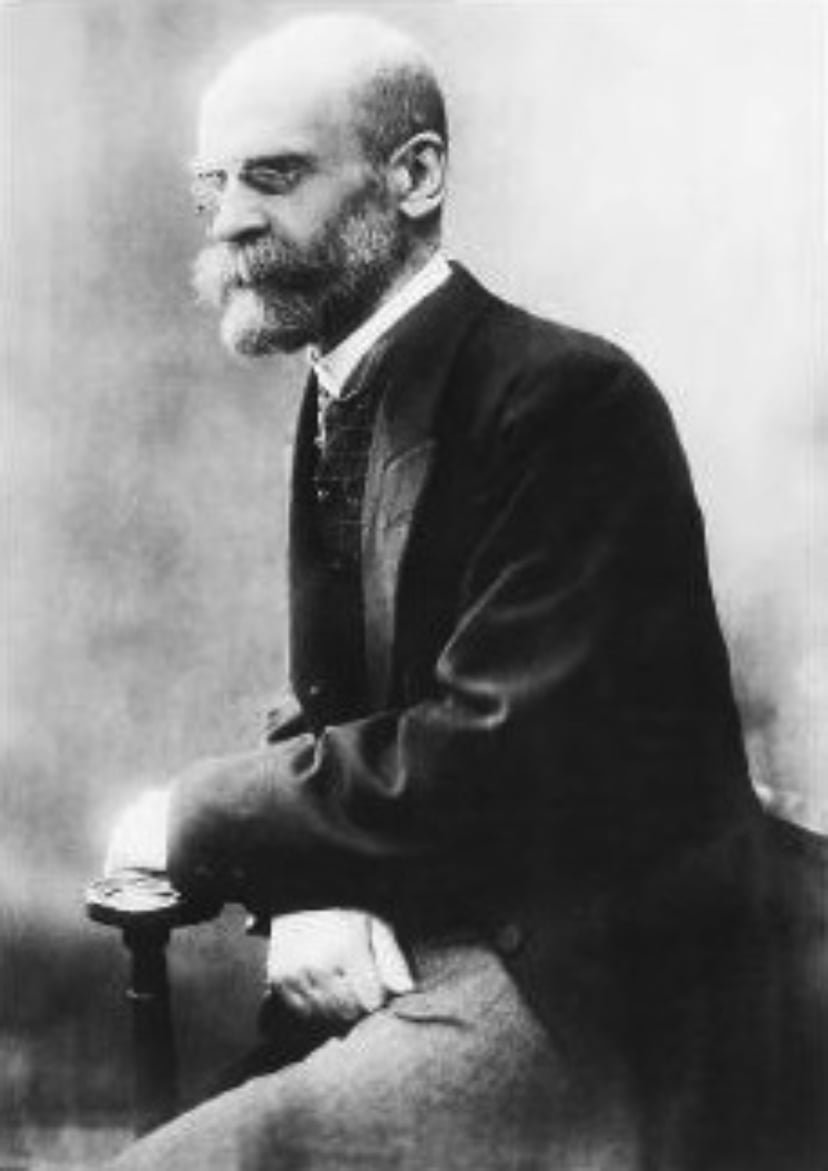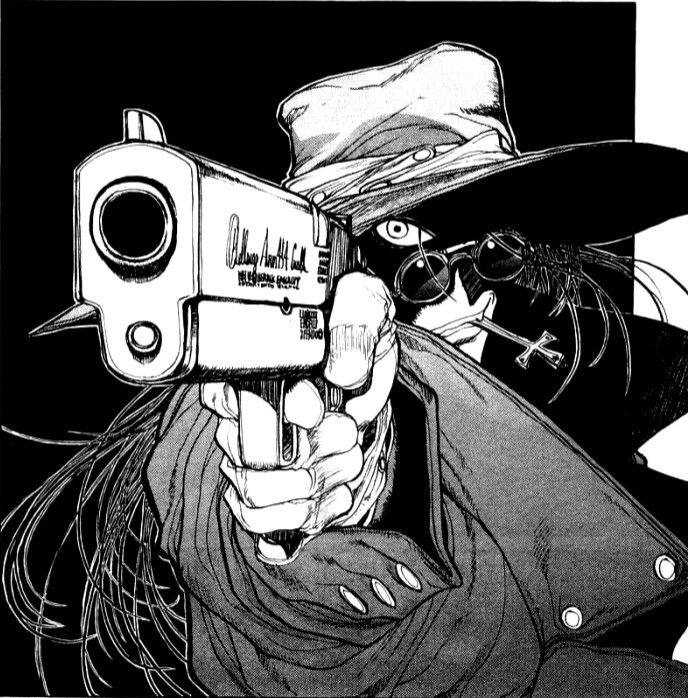

Alucard
![]()
|
アーカード
|
|
|---|---|
| Personal Description | |
| Aliases | Vampire Alucard |
| Affiliations | Hellsing Organisation |
| Gender | Fundamentally a Male |
| Race | Real Vampire |
| Age | 500s (1999) |
| Manga Debut | Hellsing: Volume 1 |
| OVA Debut | Hellsing: Ultimate I |
Alucard
Japanese Name:アーカード (Ākādo)
Role:One of the three main protagonists ofHellsing
Affiliations:Hellsing Organization
Voice Actors:Jouji Nakata (Japanese), Crispin Freeman (English)
|
Émile Durkheim
|
|
|---|---|
| Born |
David Émile Durkheim
15 April 1858 Épinal, France
|
| Died | 15 November 1917(aged 59)
Paris,France
|
| Nationality | French |
| Alma mater | École Normale Supérieure |
| Known for | Sacred–profane dichotomy Collective consciousness Social fact Social integration Anomie Collective effervescence |
| Scientific career | |
| Fields | Philosophy, sociology, education, anthropology, religious studies |
| Institutions | University of Paris, University of Bordeaux |
| Influences | Immanuel Kant, René Descartes,Plato, Herbert Spencer,Aristotle, Montesquieu, Jean-Jacques Rousseau, Auguste Comte. William James, John Dewey, Fustel de Coulanges, Jean-Marie Guyau, Charles Bernard Renouvier, John Stuart Mill |
| Influenced | Marcel Mauss,Claude Lévi-Strauss, Talcott Parsons, Maurice Halbwachs, Jonathan Haidt, Lucien Lévy-Bruhl,Bronisław Malinowski, Fernand Braudel, Pierre Bourdieu, Charles Taylor, Henri Bergson, Emmanuel Levinas, Steven Lukes, Alfred Radcliffe-Brown, E. E. Evans-Pritchard, Mary Douglas, Paul Fauconnet, Robert N. Bellah, Ziya Gökalp, David Bloor, Randall Collins, Neil Smelser[1] |
Appearance
Alucard is depicted with a striking and imposing presence, characterized by his tall stature, long black hair, and red eyes, which serve to emphasize his vampiric nature. He typically wears a long black trench coat over a white shirt and black trousers, complemented by a wide-brimmed red hat and gloves. His appearance is often complemented by a pair of glasses, which he occasionally removes during combat, further highlighting his intense demeanor and readiness for battle.

With a wicked grin and a steady hand, Alucard unleashes the full power of his gun, embodying his dark and fearless nature as he faces his enemies with unmatched confidence.
Personality
Alucard’s character embodies a complex interplay of arrogance, nihilism, and a deep-seated loyalty to the Hellsing Organization. He exhibits a playful and sadistic nature, often reveling in the chaos of battle and the suffering of his foes. However, beneath this exterior lies a profound respect for Sir Integra Hellsing, whom he considers his master. His relationships are characterized by a mix of loyalty and an enigmatic detachment, as he operates on a different moral plane than other characters in the series.
Background and Story
Alucard serves as the Trump Card of the Hellsing Organization, an elite institution dedicated to combating supernatural threats, particularly vampires. He is bound to the Hellsing family, specifically Sir Integra, and is compelled to follow her commands without question. Alucard’s origin is shrouded in mystery, with hints suggesting he is a centuries-old vampire with a tumultuous past, including ties to various historical events and figures. His transformation into a vampire and subsequent servitude to the Hellsing family mark a pivotal point in his existence, influencing his motivations and actions throughout the series.
Key Rivalries and Relationships
Seras Victoria
As Alucard’s fledgling, Seras represents a significant aspect of his character development. He acts as both a mentor and a challenger, guiding her in navigating her new identity as a vampire while simultaneously ing her limits. Their relationship is marked by a blend of camaraderie and complexity, as Alucard’s mentorship forces Seras to confront her own humanity.
Sir Integra Hellsing
Alucard shares a unique bond with Integra, defined by mutual respect and an unyielding loyalty. He acknowledges her authority and displays a fierce protectiveness over her, often referring to her as “my Master.” Their dynamic plays a critical role in shaping the narrative, as Alucard’s actions are heavily influenced by his commitment to her vision for the Hellsing Organization.
Abilities and Skills
- Superhuman Strength and Agility:Alucard possesses immense physical power, enabling him to overpower opponents with ease. His speed and agility enhance his combat effectiveness, allowing him to dodge attacks and counter swiftly.
- Regenerative Healing:His vampiric nature grants him accelerated healing abilities, allowing him to recover from injuries that would be fatal to ordinary beings.
- Blood Manipulation:Alucard can manipulate blood, using it as a weapon or a means of controlling other beings, showcasing his mastery over his vampiric abilities.
- Transformation Abilities:Alucard can transform into various forms, including that of a monstrous beast, enabling him to unleash devastating attacks on his enemies.
- Immortality:As a vampire, Alucard is functionally immortal, although he can be temporarily incapacitated through specific means. His true death is a complex concept tied to his connection with the Hellsing family.
Character Development
Alucard’s journey throughout Hellsing illustrates the themes of power, servitude, and the moral complexities inherent in the supernatural realm. His character serves as a reflection of the struggles between humanity and monstrosity, often challenging the perceptions of good and evil. As he engages in combat against various supernatural entities, his interactions with Sir Integra and Seras catalyze significant growth, forcing him to confront his own beliefs about power, loyalty, and the nature of existence.
Trivia
Trivia:
★ Alucard’s iconic phrase, “Give me your orders, my Master,” underscores his loyalty to Integra and encapsulates his role within the Hellsing Organization.
★ His character design and abilities draw heavily from vampire mythology and folklore, showcasing a blend of traditional and modern interpretations of the vampire archetype.
★ Alucard’s enigmatic nature and philosophical musings often serve as a narrative device, prompting deeper exploration of the series’ themes regarding the nature of power and morality.